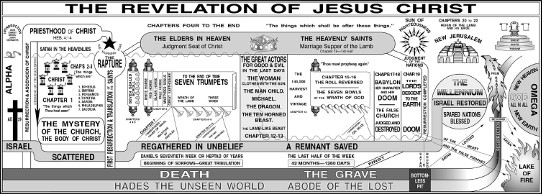For this week please read Chapter 7 “The Hallway at the End of the Universe” and Chapter 8, “A Room with a View” of Fr. Stephen Freeman’s book Everywhere Present: Christianity in a One-Storey Universe. In Chapter 7, Fr. Freeman discusses the non-linear nature of time for a Christian.
The Problem:
In modern western society, we think in terms of the progression of time. Time has a beginning and an end. Time progresses along a timeline. What happened in the past is trapped in the past, and what is going to happen in the future is inaccessible because it has not yet occurred. We live in a world of cause and effect. A happens to cause B which causes C. This is why, Fr. Freeman says, we fight over history because we think that our history causes our present. In a timeline, Truth is reduced to mean simply “what actually happened.”
In a religion captured by time, we want to know how it ends. In the 18th century, our modern Christian understanding of the Rapture and Dispensationalism began with men such as John Darby or William Miller. The books The Late, Great, Planet Earth or The 88 Reason Why the Rapture Will Be in 1988 are a product of this very modern linear way of understanding Christianity. The Kingdom of God is not near (Luke 10), rather it is somewhere out in the future. This linear understanding of time, traps the story and the power of the Gospel either in the past when Jesus walked the earth or in the future when he returns in glory. The present is devoid of this power except in our remembering a past event or in our looking forward to a future yet to come.
Christ’s real presence in our lives, in the church, and in the sacraments is removed to a second-storey spirituality of which our world (including our religion and our churches) have very little need.
God and Time:
However, as we have looked at before, time is a product of creation. God created time. God is not subject to time. The Scriptures, support this understanding of the atemporality of God. At Mt. Sinai, God discloses himself to Moses as “I AM WHO I AM” Ex. 3:14. God’s essential nature is the eternal present. Likewise, in Revelation, God says “I am the Alpha and the Omega, the beginning and the end.” Rev. 22:13. God does not say that he was the Alpha and will be the Omega, but that he is. Or to mix the divine and human timelines, Jesus says that “Before Abraham was, I am.” John 8:58. God’s time is always in the present. God and the Kingdom of God are everywhere present.
The One-Storey Solution:
The traditional biblical Christian understanding is that God’s actions within history and specifically those of Jesus Christ are always in the present. God’s acts are not trapped in the long-ago past or only to be revealed at some date in the future, but are now. As Fr. Freeman says, Christianity is a religion of eschatology (the end-times), but the end is not temporal but personal. We find our end, not in a future event, but in the person of Jesus Christ. Jesus is the end.
Paul writes: “Even when we were dead in trespasses, [God] made us alive together with Christ (by grace you have been saved), and raised us up together, and made us sit together in the heavenly places in Christ Jesus.” Eph. 2:5-6. Paul tells us that the Kingdom of God has already come in the person of Jesus of Christ and that those who are in Christ are already “seated in the heavens.” The death and resurrection of Christ are not merely historical events in the secular sense, but are very present and real now. Christ is Dead, Christ is Risen, and Christ is Come Again.
If you want to digger deeper into Fr. Freeman’s thoughts on this issue, see his blog posts Here, Here, and Here.
Therefore, if anyone is in Christ, he is a new creation; old things have passed away; behold, all things have become new.
2 Cor. 5:17


Yeah, kairos! It is alway time for the great I AM.